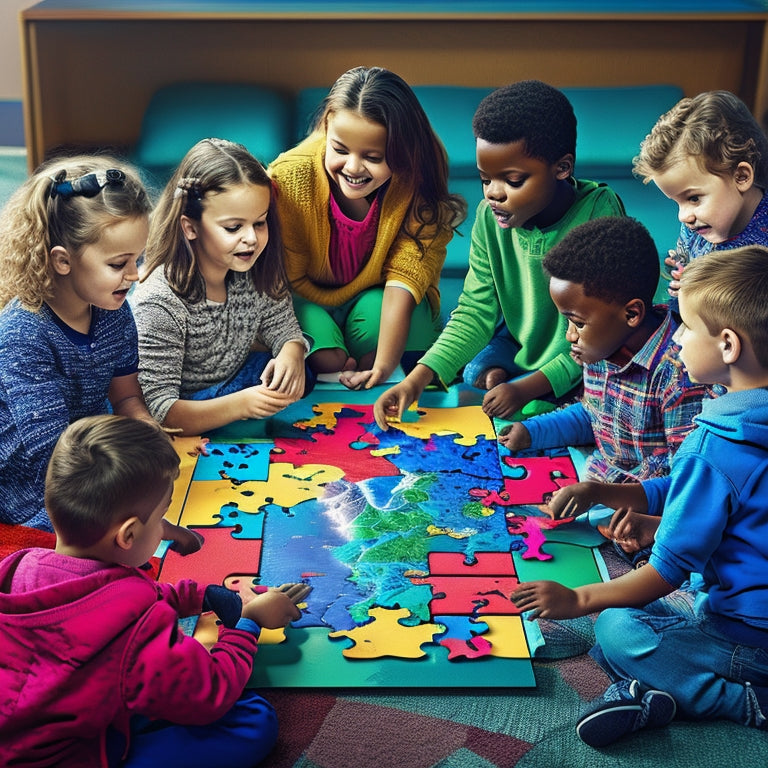
Engaging Logic Puzzles for Elementary Children
Share
Once upon a time, in the land of elementary education, there existed a magical book filled with engaging logic puzzles. This book, designed specifically for young minds, aimed to captivate and educate children through the power of puzzles.
Its pages, over 100 in total, held a treasure trove of challenges suitable for kids of all ages. Within its confines, word search puzzles awaited, ready to enhance vocabulary and spelling skills. Sudoku puzzles, on the other hand, stood as guardians of memory and mental agility, beckoning children to solve their numerical mysteries.
With its large print and paperback format, the book provided an accessible gateway to the world of logic. But it didn't stop there. Bonus content, including tips, tricks, and answer keys, added an extra layer of enchantment.
Suitable for 1st to 5th-grade students, this book became a shared adventure for parents and children alike, fostering bonds and knowledge. With a 100% money-back guarantee, it ensured customer satisfaction, leaving no room for disappointment.
In this article, we will explore the wonders of this magical book and the benefits it brings to young minds.
- Logic puzzles in the book enhance critical thinking and reasoning abilities.
- Engaging children in problem-solving activities is crucial for their cognitive development and problem-solving skills.
- The book includes over 100 pages of challenges suitable for kids of all ages, including word search puzzles and Sudoku puzzles.
- Solving logic puzzles strengthens cognitive abilities and prepares children for real-life situations.
Puzzle Book Details
The puzzle book, written by Lynn Red and released on 08-07-2020 with an EAN of 9798664861709, consists of 153 pages and offers engaging logic puzzles suitable for elementary children.
Although the product is currently sold out, when available, it is priced at $9.95 USD.
The book features over 100 pages of puzzles, including word searches and Sudoku grids, which improve vocabulary, spelling, memory, and problem-solving abilities.
The puzzles are printed on high-quality paper and the book has a durable trade paperback binding.
Additionally, the book provides bonus content such as tips, tricks, and answer keys.
It is suitable for 1st to 5th-grade students and makes a great stocking stuffer.
Customer satisfaction is guaranteed with a 100% money-back policy.
Benefits of Logic Puzzles
Exercising the cognitive muscles through the exploration of intricate mind-teasers not only nurtures young minds but also hones their critical thinking abilities, providing them with the necessary tools to navigate the complexities of the world around them.
Logic puzzles, such as those found in the elementary children's educational puzzle book, offer several benefits for cognitive development and problem-solving skills:
-
Enhances critical thinking: Logic puzzles require children to analyze information, make connections, and draw conclusions, improving their reasoning abilities.
-
Boosts problem-solving skills: By engaging in puzzles, children learn to approach problems systematically, break them down into smaller parts, and find creative solutions.
-
Develops patience and perseverance: Solving logic puzzles requires patience, as children must persistently work through challenges to find the correct answers.
-
Increases attention span: Puzzles require sustained focus, helping children improve their concentration and attention to detail.
Through engaging with logic puzzles, children can enhance their cognitive development and problem-solving skills, equipping them with valuable tools for success.
Suitable Age Range
Cognitive development and problem-solving skills can be effectively enhanced through the exploration of age-appropriate mind-teasers. Engaging children in problem-solving activities, such as logic puzzles, is crucial for the development of critical thinking skills.
Logic puzzles require children to think analytically, make connections, and find solutions through trial and error. By engaging in these activities, children learn to think creatively, develop problem-solving strategies, and improve their ability to reason and make logical deductions.
This not only strengthens their cognitive abilities but also prepares them for real-life situations where critical thinking skills are essential. Providing elementary children with engaging logic puzzles is a valuable way to foster cognitive development and help them become proficient problem solvers.
Frequently Asked Questions
How can logic puzzles benefit a child's cognitive development?
Logic puzzles can benefit a child's cognitive development by improving problem-solving skills, critical thinking abilities, and logical reasoning. To incorporate logic puzzles into a child's daily routine, parents can set aside dedicated puzzle time, encourage independent puzzle-solving, and provide age-appropriate puzzle books.
Are there any additional activities or games included in the puzzle book?
The puzzle book includes additional activities and games that complement the logic puzzles. These activities provide further opportunities for cognitive development and entertainment, enhancing the overall learning experience for elementary children.
Can the puzzle book be used as a learning tool in a classroom setting?
Yes, the puzzle book can be used as a learning tool in a classroom setting. It can be integrated into lesson plans for various subjects and used as a collaborative problem-solving activity using logic puzzles.
Is there a limit to the number of times a child can attempt a puzzle?
There are no specific limitations on the number of times a child can attempt a puzzle. Encouraging persistence can be done through strategies such as providing hints, breaking down the puzzle into smaller steps, and celebrating small successes.
Are the puzzles in the book suitable for both individual and group use?
One advantage of solving logic puzzles in a group setting is the opportunity for collaboration and teamwork, which can foster a sense of camaraderie and motivation. Strategies for adapting the puzzles for different skill levels can include providing hints or assigning roles within the group.